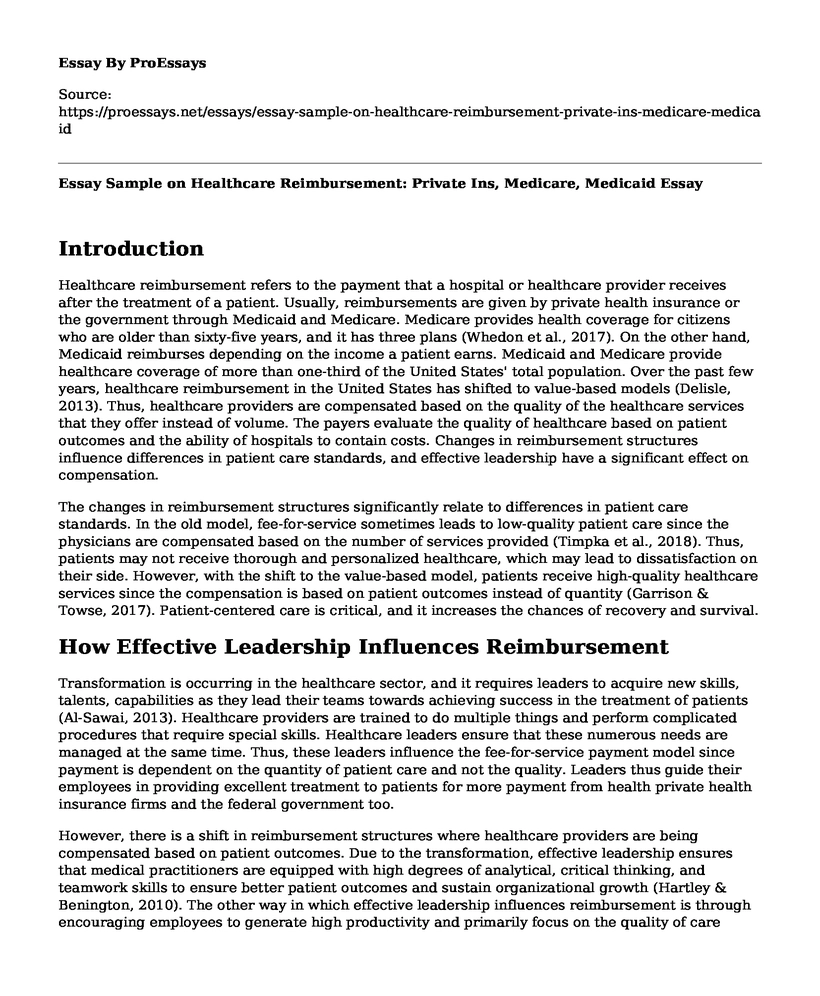Introduction
Healthcare reimbursement refers to the payment that a hospital or healthcare provider receives after the treatment of a patient. Usually, reimbursements are given by private health insurance or the government through Medicaid and Medicare. Medicare provides health coverage for citizens who are older than sixty-five years, and it has three plans (Whedon et al., 2017). On the other hand, Medicaid reimburses depending on the income a patient earns. Medicaid and Medicare provide healthcare coverage of more than one-third of the United States' total population. Over the past few years, healthcare reimbursement in the United States has shifted to value-based models (Delisle, 2013). Thus, healthcare providers are compensated based on the quality of the healthcare services that they offer instead of volume. The payers evaluate the quality of healthcare based on patient outcomes and the ability of hospitals to contain costs. Changes in reimbursement structures influence differences in patient care standards, and effective leadership have a significant effect on compensation.
The changes in reimbursement structures significantly relate to differences in patient care standards. In the old model, fee-for-service sometimes leads to low-quality patient care since the physicians are compensated based on the number of services provided (Timpka et al., 2018). Thus, patients may not receive thorough and personalized healthcare, which may lead to dissatisfaction on their side. However, with the shift to the value-based model, patients receive high-quality healthcare services since the compensation is based on patient outcomes instead of quantity (Garrison & Towse, 2017). Patient-centered care is critical, and it increases the chances of recovery and survival.
How Effective Leadership Influences Reimbursement
Transformation is occurring in the healthcare sector, and it requires leaders to acquire new skills, talents, capabilities as they lead their teams towards achieving success in the treatment of patients (Al-Sawai, 2013). Healthcare providers are trained to do multiple things and perform complicated procedures that require special skills. Healthcare leaders ensure that these numerous needs are managed at the same time. Thus, these leaders influence the fee-for-service payment model since payment is dependent on the quantity of patient care and not the quality. Leaders thus guide their employees in providing excellent treatment to patients for more payment from health private health insurance firms and the federal government too.
However, there is a shift in reimbursement structures where healthcare providers are being compensated based on patient outcomes. Due to the transformation, effective leadership ensures that medical practitioners are equipped with high degrees of analytical, critical thinking, and teamwork skills to ensure better patient outcomes and sustain organizational growth (Hartley & Benington, 2010). The other way in which effective leadership influences reimbursement is through encouraging employees to generate high productivity and primarily focus on the quality of care metrics to ensure good patient outcomes.
A good leader in the healthcare sector must have the necessary skills and abilities to guide their teams for the best patient outcomes, which determine value-based reimbursement. One of the ways in which good leadership promotes excellent patient care is through collaboration. Leaders can encourage their subordinates to work with each other and intersect their expertise (Al-Sawai, 2013). Leaders should also inspire and motivate their employees to work harder in providing patient-centered care. Good leaders also encourage communication between them and employees, recognize their expertise and effort too. Such qualities of good leadership motivate healthcare providers to provide proper patient care that is crucial for value-based reimbursement.
Conclusion
In summary, the changes in reimbursement structures significantly relate to differences in patient care standards. The value-based model ensures that patients receive high-quality healthcare services since the compensation is based on quality instead of quality. Due to the transformation regarding reimbursement models, effective leadership ensures that medical practitioners are equipped with high degrees of analytical, critical thinking, and teamwork skills to provide better patient outcomes.
References
Al-Sawai, A. (2013). Leadership of healthcare professionals: where do we stand? Oman medical journal, 28(4), 285.
Delisle, D. R. (2013). Big things come in bundled packages: implications of bundled payment systems in health care reimbursement reform. American Journal of Medical Quality, 28(4), 339-344.
Garrison, L. P., & Towse, A. (2017). Value-based pricing and reimbursement in personalized healthcare: introduction to the basic health economics. Journal of personalized medicine, 7(3), 10.
Hartley, J., & Benington, J. (2010). Leadership for healthcare. Policy Press.
Timpka, T., Nyce, J. M., & Amer-Wahlin, I. (2018). Value-based reimbursement in collectively financed healthcare requires monitoring of socioeconomic patient data to maintain equality in service provision. Journal of general internal medicine, 33(12), 2240-2243.
Whedon, J., Tosteson, T. D., Kizhakkeveettil, A., & Kimura, M. N. (2017). Insurance reimbursement for complementary healthcare services. The Journal of Alternative and Complementary Medicine, 23(4), 264-267.
Cite this page
Essay Sample on Healthcare Reimbursement: Private Ins, Medicare, Medicaid. (2023, May 07). Retrieved from https://proessays.net/essays/essay-sample-on-healthcare-reimbursement-private-ins-medicare-medicaid
If you are the original author of this essay and no longer wish to have it published on the ProEssays website, please click below to request its removal:
- Lack of Exercise and the Social Determinants Essay
- Reflective Essay on Volunteerism in Hunger Resource Center
- Supplements for Strength-Power Athletes Paper Example
- Business Plan for Golden Hearts Senior Care
- Essay Sample on Mixed Anxiety/Depression & Substance Use: Effective Diagnosis & Treatment
- Research Paper on Women & STIs: A Closer Look at Sex Differences in Diagnosis & Treatment
- Essay Example on Teen Driving: 14% of Accidents Caused by Inexperienced Drivers







